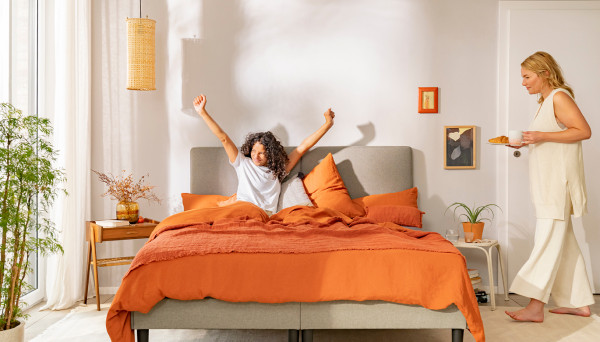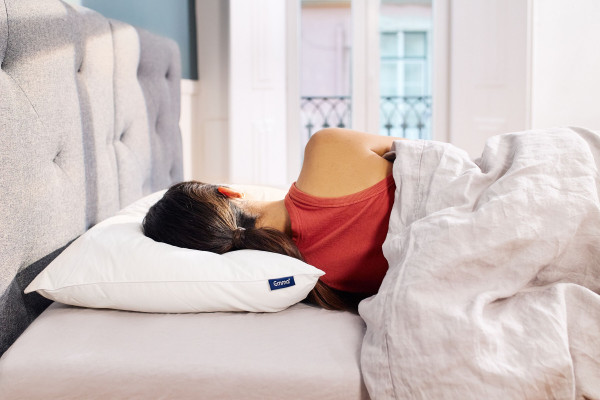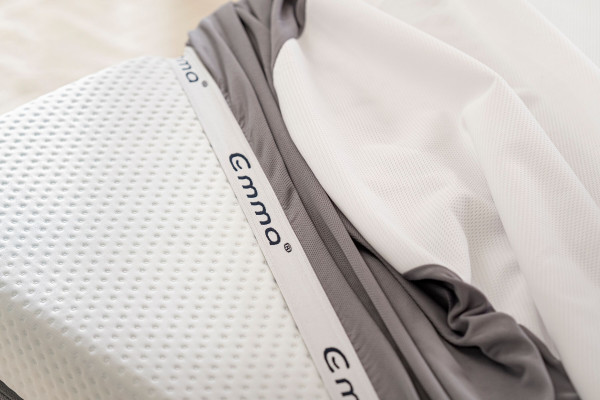Remix chats with a Sleep Scientist on lunar cycles, sleep patterns and how to get a better night’s sleep.
Sleep. It’s one of the key ingredients to a healthy life. We rely on sleep to regulate our bodies, stabilise our moods and recharge our batteries - so when our sleep gets disrupted, it tends to affect every aspect of daily life. As a person who has always been a terrible sleeper, I envy people who can fall asleep with ease, and stay asleep. More often than not, it takes a sacrifice to the sleep gods to allow me to get a good night's kip. Of course, it doesn’t help that I spend my last waking hours in bed scrolling through my phone and making mental checklists of everything I want to achieve in the next five years. Or making up hypothetical arguments in my head and playing out exactly how I was going to rebut. And that’s on a good night.

I find that my sleep is even more disrupted around a full moon. I’ve always been curious about this phenomenon. Was it something mystical, does it have something to do with my Zodiac sign? Was the moon's gravitational pull trying to beckon me? Or, is there a perfectly logical and scientific explanation behind my lack of sleep?
Armed with these questions and the knowledge that I am not alone in my battle for a good night's rest, I reached out to someone who might be able to shed some light on my dire sleep situation. Theresa Schnorbach is a Sleep Scientist at Emma - The Sleep Company, makers of The Emma Sleep Mattress - a multi-award-winning mattress and pro’s in the field of sleep. Surely she would be able to tell me where I was going wrong with my sleep habits and why the lunar cycle seems to affect me so much.
And she could. Here is what she had to say…

What are the moon phases and can they affect our sleep?
There are four principal moon phases that form the lunar cycle – new moon, first quarter, full moon and last quarter. Our natural circadian rhythms are entrained to the phases of the lunar cycle. Research shows that on the nights before the full moon, people go to bed later than usual and sleep less on average.
How does a full moon affect our sleep?
During a full moon, the moonlight emits a bluish light that impedes our bodies' production of melatonin – an essential sleep hormone that helps us to relax and fall asleep easily. Decreased levels of melatonin make it more difficult to fall asleep as we are more alert than sleepy. Moreover, high levels of cortisol (a stress hormone that helps us stay awake during the day) are connected with bluish light and raise our alertness.

Are there gender-specific lunar effects on sleep?
No one lucks out here, the full moon affects everyone of all ages, genders and locations.
I always sleep terribly on a full moon, is this common?
Yes, it’s very common! Can confirm it has nothing to do with your Zodiac sign.
What are the signs to watch out for if you’ve had a terrible sleep?
Sleep is a natural mood booster and an adequate sleep of around 7-9 hours allows your mind and body enough time to recharge and wake up feeling refreshed. Think of getting optimal sleep like recharging a battery - when the battery is fully charged, it has the positive energy it needs to perform throughout the day. During sleep, your brain cleanses out toxins to strengthen your memories and regulate metabolic and hormonal processes. A bad sleep is similar to an empty battery where you feel like you’re running on no charge. This can result in not only feeling more tired but a decrease in muscle strength, oxygen levels and emotional health.

Have you got any tips on how to get a better night's sleep?
- Limit exposure to light sources in your bedroom - close curtains and avoid using electronic devices before bed.
- Set a regular bedtime schedule so that your body is ready to fall asleep and, most importantly, wake up at the same time every day, regardless of the celestial influence.
- Create a relaxing environment in the 2-3 hours leading up to your bedtime that reduces your cortisol levels and helps to increase melatonin levels. Allow yourself to wind down from the excitement of the day. Enjoy a bath or wrap up in cosy blankets to keep your body warm during the winter evenings which helps you to relax and get sleepy.
- Prevent the night sweats or shivers with a thermo-regulating mattress like the Emma Sleep Comfort – no matter what time of year it is, the mattress has an innovative breathable foam that keeps you at the perfect temperature.

How important is it to invest in a good quality mattress?
We spend almost 1/3 of our lives asleep so it is vital our bodies are supported by a good quality mattress. A mattress like the Emma Sleep Comfort Mattress that features HRX foam provides proper hip, shoulder and spinal alignment to give your body the best support no matter what position you like to sleep in.
Do you need to spend lots of money on a quality mattress?
Price doesn’t always mean quality and it’s better to focus on choosing a mattress that’s backed by sleep research and is the right one for you.

What would be your advice on how to shop for a good quality mattress?
- Make sure to test the mattress thoroughly - five minutes lying on a new mattress is not enough to decide whether it’s the one for you! Our bodies need days or even weeks to adjust to a new mattress and it’s important to test it out in positions you would normally sleep in. The Emma Sleep 100-night trial is risk-free and if you decide it’s not for you, we’ll collect it for free and donate it to charity.
- Look for breathable and temperature regulating materials - the onset of sleep usually coincides with a drop in core body temperature as the body releases heat, so thermoregulating materials that are also moisture-wicking (such as those found in Emma Sleep Mattresses) are great for your sleep so you don’t feel trapped in your own heat.
- Don’t forget to invest in a pillow that supports your neck and adjusts to how you sleep. Since most people can be considered ‘mixed sleepers’ that change their sleeping position through the night, a good pillow should be flexible. Ideally, it should have a harder and a softer side and be variable in height with removable inner layers like the Emma Sleep Foam Pillow.






